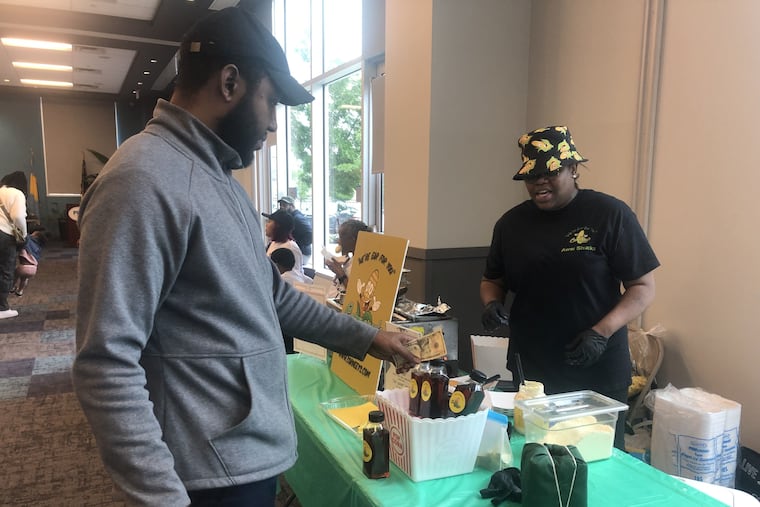These Philly entrepreneurs were able to start businesses because they live in Philadelphia Housing Authority homes
Through an entrepreneurial fellowship program, PHA residents have been able to start and grow businesses selling vegan desserts, gourmet corn, crab balls, skin-care products, clothing, and more.

Reshay Kennedy traces her love of baking to her childhood, when she made desserts in her Easy-Bake Oven and made treats with her grandmom. Having her own children pushed her to turn a hobby into a business during the pandemic.
She became more aware of how much sugar and preservatives are in baked goods and wanted to offer alternatives. So in January 2021, Kennedy started Nuri’s Sweet Treats. She sells her desserts, including vegan and sugar-free options, at pop-up events and is working to get into farmers markets this summer.
“By the end of this year, I will have my dessert truck,” she said. “That’s the goal for me.”
Kennedy is one of about 40 Philadelphians who have been able to start or grow businesses because of the homes they live in: They’re Philadelphia Housing Authority residents.
» READ MORE: HUD's Family Self-Sufficiency Program turns rent increases into savings
Through the public housing authority’s six-month entrepreneurial fellowship program, started in 2021, residents learn budgeting, cash flow management, marketing, and other skills. They get help establishing their companies and getting licenses. And they receive up to $3,000 as a small business grant and up to $2,000 to reimburse them for business expenses. In March, Kennedy completed PHA’s advanced one-year version.
The program gets some of its funding from the U.S. Department of Housing and Urban Development’s Moving to Work program. The federal agency gives money to public housing authorities to develop programs that help their residents become self-sufficient.
“This is a real opportunity that sets up our residents to succeed in the real world by becoming their own boss,” said Kelvin Jeremiah, president and chief executive officer of PHA, which is one of the largest social services providers in Philadelphia. “PHA’s mission is to open doors. Not just to housing but also to economic opportunity.”
The agency is planning to open its own kind of Reading Terminal Market, a place where PHA residents can — at a nominal cost — set up to sell their products. PHA anticipates starting construction by the end of the year on land it owns near its North Philadelphia headquarters.
The businesses that PHA residents have created are in various stages. Some of the entrepreneurs are just getting started, and others are looking to expand. Some also have 9-to-5 jobs, while others work full time for their business. Some have just entered their adult working years, and others are at or near retirement age.
Fellowship applicants must be 18 or older and live in PHA housing or have a subsidized housing voucher. More than 1,500 PHA residents have applied.
“I didn’t realize how widespread the need was among our population,” Jeremiah said. “But I think it speaks, frankly, to the lack of opportunities that marginalized communities face. It’s not that we don’t have ideas about how we want to live, how we can find economic success. It’s just that we don’t have access to the opportunities.”
PHA residents creating businesses
Donta Daniels, 27, got into the program on his second try. This year, he launched his clothing brand, We Are Pixxxies, and printed shirts in time for a pop-up event Wednesday that showcased PHA residents’ businesses at the agency’s headquarters.
Daniels said he comes from a long line of seamstresses and patternmakers and tried to run a clothing company before, but it didn’t work out. Through PHA’s program, he said, he became more business minded and developed skills he needed.
“A lot of people aren’t aware of the opportunities in our communities,” he said. “And I’m a firm believer of searching for resources within your community.”
He said he wants his brand to speak to creatives and misfits.
“A lot of people, when they think of streetwear culture, they think of, like, sneakers … but there’s also this subculture of campy kids who are out there, and that’s who we represent,” he said.
All the business owners who have completed the entrepreneurial fellowship have qualified to become PHA vendors.
Aisha Burnett owns Ruthann’s Kitchen, the soul food business PHA hired in January to cater a lunch for visiting officials from the Department of Housing and Urban Development.
Nija Wiggins has entered her busiest time as the owner of Corneey’s, which sells gourmet corn on the cob and flavored popcorn. It’s both corn season and the time of year when Philly neighborhoods start ramping up community festivals, where she sets up her food truck.
Emelly Raquel Resto has a skin care line of body butters and oils specifically for melanin-rich people that are made with natural products. Resto, 26, came up with the idea when she was 21 but officially launched Anoint by Ra in April. She’s working on getting a bachelor’s degree in business.
Kellie Finney has worked in the medical field for two decades, but she’s crafty and creative and this year turned a hobby into LavishRoseCreations through the entrepreneurship program.
“PHA is so much more than what people believe — just Section 8 housing,” she said.
Finney makes T-shirts and personalized party favors, from candy bars to wine bottles, for proms, graduations, birthdays, and other events.
“I like to help people take their visions and create it into something unique and one-of-a-kind,” she said.
Finney had never thought about starting a business before hearing about PHA’s program.
“They take people that have a dream but not much direction and give them the tools that they need to succeed,” she said. “It gives you the opportunity to grow and be your own boss and make extra money. And do something that you have a passion about.”